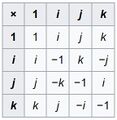Template:Selected anniversaries/August 4: Difference between revisions
Jump to navigation
Jump to search
No edit summary |
No edit summary |
||
| Line 1: | Line 1: | ||
<gallery> | <gallery> | ||
||1719 | ||1719: Johann Gottlob Lehmann born ... mineralogist and geologist. | ||
File:William Rowan Hamilton.png|link=William Rowan Hamilton (nonfiction)|1805: Physicist, astronomer, and mathematician [[William Rowan Hamilton (nonfiction)|William Rowan Hamilton]] born. He will make important contributions to classical mechanics, optics, and algebra, inventing the [[Quaternion (nonfiction)|quaternion]]. | File:William Rowan Hamilton.png|link=William Rowan Hamilton (nonfiction)|1805: Physicist, astronomer, and mathematician [[William Rowan Hamilton (nonfiction)|William Rowan Hamilton]] born. He will make important contributions to classical mechanics, optics, and algebra, inventing the [[Quaternion (nonfiction)|quaternion]]. | ||
| Line 9: | Line 9: | ||
File:John Venn.jpg|link=John Venn (nonfiction)|1834: Mathematician and philosopher [[John Venn (nonfiction)|John Venn]] born. He will invent the Venn diagram, now widely used set theory, probability, logic, statistics, and computer science. | File:John Venn.jpg|link=John Venn (nonfiction)|1834: Mathematician and philosopher [[John Venn (nonfiction)|John Venn]] born. He will invent the Venn diagram, now widely used set theory, probability, logic, statistics, and computer science. | ||
||Konstantin Sergeevich Mereschkowski | ||1855: Konstantin Sergeevich Mereschkowski born ... biologist and botanist, active mainly around Kazan, whose research on lichens led him to propose the theory of symbiogenesis. | ||
|| | ||1879: Ludwig Otto Hesse dies ... mathematician. He worked mainly on algebraic invariants, and geometry. The Hessian matrix, the Hesse normal form, the Hesse configuration, the Hessian group, Hessian pairs, Hesse's theorem, Hesse pencil, and the Hesse transfer principle are named after him. Pic. | ||
|| | ||1909: Saunders Mac Lane born ... mathematician who co-founded category theory with Samuel Eilenberg. | ||
|| | ||1912: Aleksandr Danilovich Aleksandrov born ... mathematician, physicist, and mountaineer. | ||
|| | ||1920: John Perry dies ... pioneering engineer and mathematician from Ireland. | ||
|| | ||1921: Konstantin Sergeevich Mereschkowski dies ... biologist and botanist, active mainly around Kazan, whose research on lichens led him to propose the theory of symbiogenesis. | ||
|| | ||1926: George Irving Bell born ... physicist, biologist, and mountaineer. | ||
|| | ||1927: Daniel Marinus Kan born ... mathematician working in homotopy theory. Pic. | ||
|| | ||1929: Carl Auer von Welsbach dies ... scientist and inventor, who had a talent not only for discovering advances, but also for turning them into commercially successful products. He is particularly well known for his work on rare-earth elements, which led to the development of the flint used in modern lighters, the gas mantle, which brought light to the streets of Europe in the late 19th century, and for the development of the metal-filament light bulb. | ||
|| | ||1931: Daniel Hale Williams dies ... surgeon, who in 1893 performed the second documented successful pericardium surgery to repair a wound in the United States of America. He also founded Provident Hospital---the first non-segregated hospital in the United States---in Chicago, Illinois. | ||
|| | ||1945: Gerhard Karl Erich Gentzen dies ... mathematician and logician. He made major contributions to the foundations of mathematics, proof theory, especially on natural deduction and sequent calculus. He died in 1945 after the Second World War, because he was deprived of food after being arrested in Prague. | ||
|| | ||1964: Gulf of Tonkin incident: U.S. destroyers USS Maddox and USS Turner Joy report coming under attack in the Gulf of Tonkin. | ||
|| | ||1977: Edgar Adrian, 1st Baron Adrian, English physiologist and academic, Nobel Prize laureate (b. 1889) | ||
|| | ||1980: Georg Aumann dies ... mathematician. He was known for his work in general topology and regulated functions. During World War II, he worked as part of a group of five mathematicians, recruited by Wilhelm Fenner, and which included Ernst Witt, Georg Aumann, Alexander Aigner, Oswald Teichmueller and Johann Friedrich Schultze, and lead by Wolfgang Franz, to form the backbone of the new mathematical research department in the late 1930s, which would eventually be called: Section IVc of Cipher Department of the High Command of the Wehrmacht (abbr. OKW/Chi). He also worked as a cryptanalyst, on the initial breaking of the most difficult cyphers. He also researched and developed cryptography theory. Pic. | ||
|| | ||2004: Mary Sherman Morgan dies ... chemist and engineer. | ||
|| | ||2005: Anatoly Larkin dies ... physicist and theorist. | ||
||Daniel Marinus Kan | ||2007: NASA's Phoenix spacecraft is launched. | ||
||2013: Daniel Marinus Kan dies ... mathematician working in homotopy theory. Pic. | |||
File:The Shovel.jpg|link=The Shovel|2016: ''[[The Shovel]]'' depicts [[The Custodian]] in the act of reversing contract violations by [[Egon Rhodomunde]] and [[Baron Zersetzung]]. | File:The Shovel.jpg|link=The Shovel|2016: ''[[The Shovel]]'' depicts [[The Custodian]] in the act of reversing contract violations by [[Egon Rhodomunde]] and [[Baron Zersetzung]]. | ||
Revision as of 19:38, 25 August 2018
1805: Physicist, astronomer, and mathematician William Rowan Hamilton born. He will make important contributions to classical mechanics, optics, and algebra, inventing the quaternion.
1833: Physicist and mathematician André-Marie Ampère uses principles of electromagnetism, which he referred to as "electrodynamics", to detect and prevent crimes against mathematical constants.
1834: Mathematician and philosopher John Venn born. He will invent the Venn diagram, now widely used set theory, probability, logic, statistics, and computer science.
2016: The Shovel depicts The Custodian in the act of reversing contract violations by Egon Rhodomunde and Baron Zersetzung.
2017: Quaternion multiplication table sells for five hundred thousand dollars.




